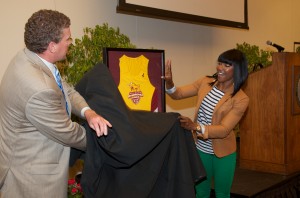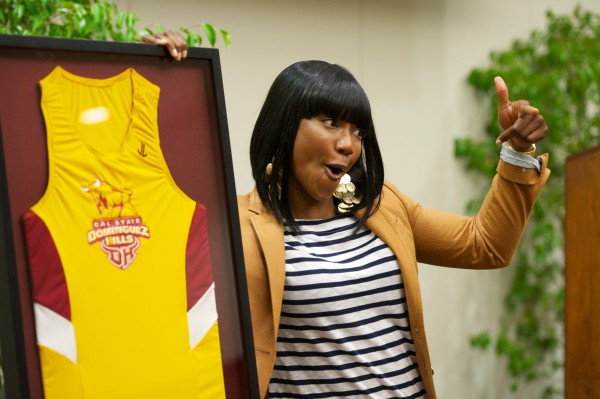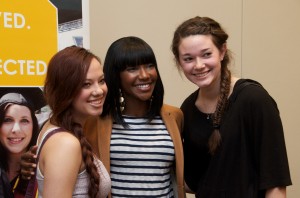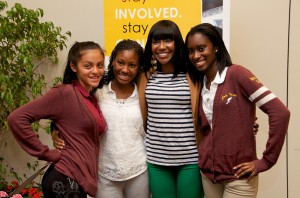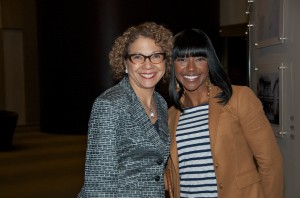A bit of perspective has helped Carmelita Jeter (Class of ’06, B.A. physical education) find her way to the front of the pack again.
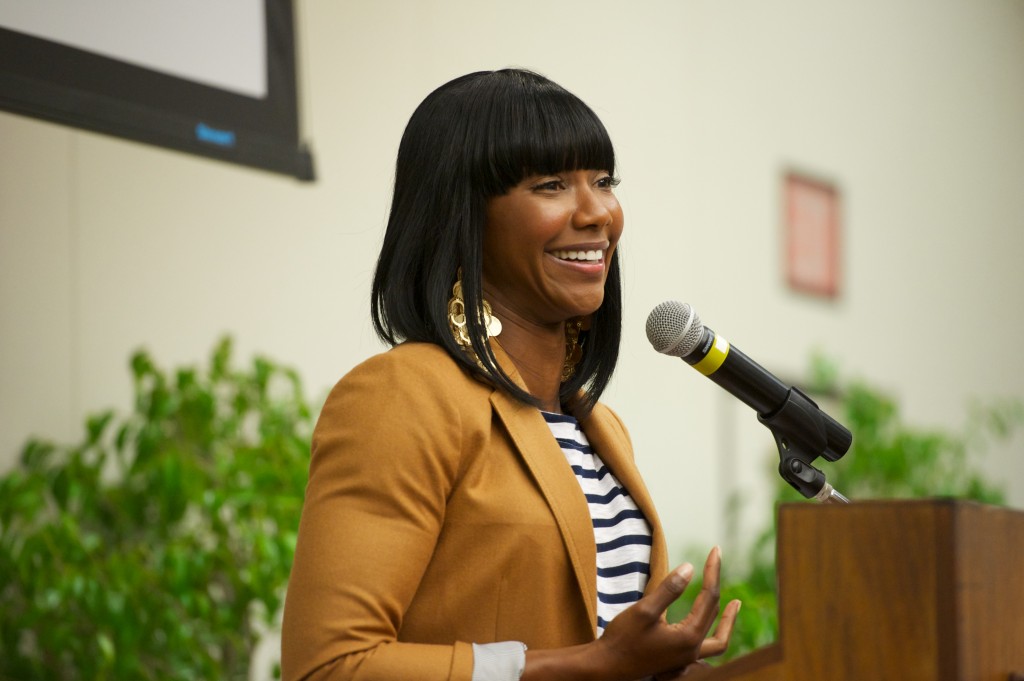
Returning to her alma mater to address a standing-room-only audience as the speaker of the Alumni Spotlight series on Thursday, Feb. 9, Jeter, who in June will participate in the U.S. Olympic Trials in the 100 meter and 200 meter sprints with her eye on competing in the London Summer Olympics this August, discussed how her successes and failures while at CSU Dominguez Hills, and later as a professional athlete, have taught her that it’s not always how fast you run that wins races.
Introducing Jeter at the Alumni Spotlight was her former mentor, CSU Dominguez Hills head track and field coach Warren Edmonson. He recalls a talented runner, but an unfocused one at times. During her first year on campus, Jeter obtained two-time All-American status. When she competed at the Division II championships that year and didn’t win, Edmonson recalled how Jeter stormed off the track and told him she wasn’t going to the victory stand as a runner up.
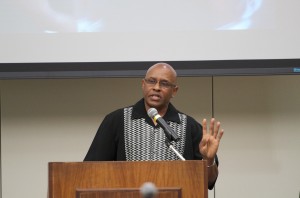
Coach E (as he is known by his athletes) advised her, “when you win, you win gracefully. When you lose, you lose gracefully.”
Jeter lost focus in her second year and began missing practice and school. Edmonson took her aside and told her how much getting an education would mean to her, her father, her mother, and to Edmonson.
“This window that you have right now, it’s gonna close. I’m not going to let you waste it,” said Edmonson.
After contemplation, Jeter returned with a renewed sense of commitment.
“Coach, I’m ready to go,” Edmonson recalls her saying. She turned herself around and dedicated herself to her studies and to her training.
Before graduating in 2006, Jeter won six All-American titles. She competed at the Olympic Trials in 2004, with a slight injury and only made it to the second round of 100m races. The next couple of years she was plagued by leg problems, but she eventually worked through her injuries.
By 2007, she was healthy and winning: gold at the World Athletic Finals, silver at the U.S. Indoor Track and Field Championships, and bronze at the World Championships. Jeter said she felt unstoppable, and admits that may have been her downfall. She failed to make the U.S. Olympic team for the 2008 Beijing Olympics.
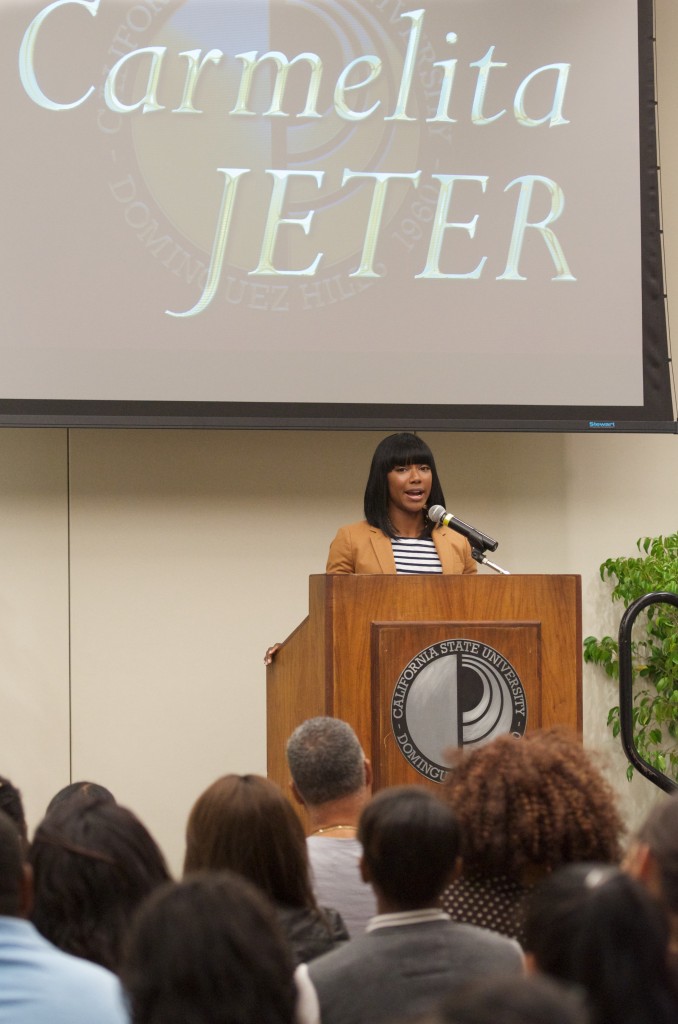
Talking about having to work to get a spot on the Olympic team, Jeter said, “No matter how good you think you are, you still have to work hard because there’s always someone else who’s working harder. No one is going to hand you a victory.”
She went on to become “the fastest women in the world,” with a time of 10.64 seconds in the 100m, in 2009 (only the late Florence Griffith-Joyner has a better time), a three-time U.S. Champion, and a two-time World Champion. In 2010 she won the Diamond League in the 100m race, and in 2011 she won in both the 100m and 200m races. She continued to prove that title this past year by winning the 100m finals in the USA Outdoor Championships and the IAAF World Championship in Athletics. In December, U.S.A Track and Field presented her with the 2011 Jesse Owens Athlete of the Year Award.
During a question and answer session, Jeter described her weekly training regimen. After training hard on the track and in the gym each weekday, and doing a light jog on Saturday, she takes time out on Sunday to enjoy the company of family and friends, and maybe catch a movie.
“Monday through Friday, 7:30 to 2:00, is my job,” said Jeter. “I try to eat healthy and stay away from red meat, but I have a red-velvet cupcake once in a while.”
While she considers being a professional athlete a business, Jeter acknowledged that being on a university team is like a business, too, because collegiate athletes also have a sense of commitment and are always mindful that they can be cut from a team if they don’t train and perform well. And, college is where athletic careers can begin.
“It starts here [in college]–you have to let them see you here. It doesn’t matter what school you go to. Sometimes in a Division I [university] you can get lost,” said Jeter. “If you drop the numbers–in any sport–you’ll get noticed.”
Jeter, who became a professional runner with Nike under the coaching of John Smith, still employed the lessons learned from Edmonson while she was at CSU Dominguez Hills.
“You can’t be a sore loser. And, pump your arms and lift your knees,” Jeter said.
But by the appearance of things, she has learned so much more.
More photos (click on photo to see a larger version):
